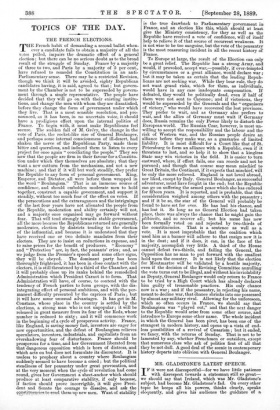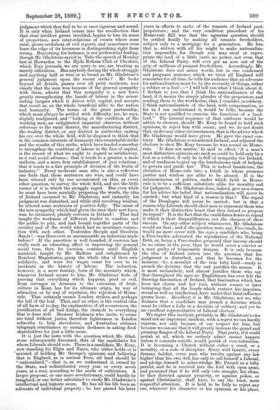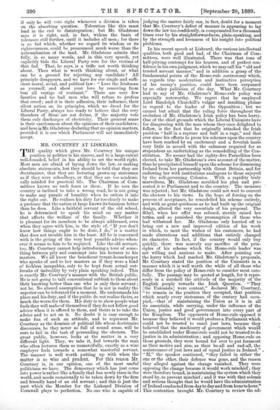MR. GLADSTONE'S LATEST SPEECH.
IF it were not disrespectful—for we have little patience with disrespect towards a statesman still so great— we should say that Ireland, which was Mr. Gladstone's subject, had become Mr. Gladstone's fad. On every other topic he keeps all his powers, thinks clearly, speaks eloquently, and gives his audience the guidance of a judgment which they feel to be at once vigorous and sound. It is only when Ireland. comes into his recollection that that clear intellect grows troubled, begins to lose its sense of proportion, sees inter-relations of events where none exist, grows credulous of evil reports, and sometimes even loses the edge of its keenness in distinguishing right from wrong. Boycotting, for instance, is not preferential dealing, though Mr. Gladstone says it is. Take the speech of Monday last at Hawarden to the Hyde Reform Club of Cheshire, which Tory journals, we are sorry to see, are treating as merely ridiculous. Has anybody during the whole struggle said anything half so wise or so broad as Mr. Gladstone's general judgment upon the recent strike ? He looks beyond all details, passes over all petty incidents, sees clearly that the men won because of the general sympathy with them, admits that this sympathy is a new force greatly strengthening the hands of labour in the never- ending bargain which it drives with capital, and accepts that result as, on the whole, beneficial alike to the nation and humanity. The terms of the great partnership, which must always be settled with difficulty, are, he says, slightly readjusted, and " looking at the condition of the working men, an enlightened impartial observer, without reference to the rural district, the manufacturing district, the trading district, or any district in particular, casting his eye over the whole field, will be disposed to think that in the common interests of humanity this remarkable strike and the results of this strike, which have tended somewhat to strengthen the condition of labour in the face of capital, is the record of what we ought to regard as satisfactory, as a real social advance ; that it tends to a greater, a more uniform, and a more firm establishment of just relations ; that it tends to a fair principle of division of the fruits of industry." Every moderate man who is also a reflective one feels that these sentences are wise, and could have been uttered. only by one accustomed on this, as every other question, to survey the whole field, and not the little corner of it in which the struggle raged. But even while he must have been mentally preparing the words, the idea of Ireland occurred to Mr. Gladstone, and instantly his judgment was disturbed, and while still revolving wisdom, he uttered some sentences of positive folly. The cause of the new sympathy which had given the men their new force, was, he intimated, plainly coercion in Ireland ! That had taught the workmen of different trades to combine and the public to pity, and had bound together parts of the country and of the world which had no necessary connec- tion with each other. Tenterden Steeple and Goodwin Sands !—was there ever so unreasonable an induction made before ? If the assertion is well founded, if coercion has really such an educating effect in improving the general social tone, then let coercion continue until English mankind, taught by Mr. Balfour and enlightened by Resident Magistrates, grasp the whole idea of their own solidarity, and wars for wages cease for ever to be incidents in the history of labour. The induction, however, is a mere fantasy, born of the necessity which, whenever Ireland occurs to him, Mr. Gladstone feels of proving that everything which happens, good or evil, from outrages in Armenia to the extension of fruit- culture in Kent, has for its ultimate origin, by way of attraction or by way of repulsion, the rejection of Home- rule. That certainly causes London strikes, and perhaps the fall of the leaf. That, and no'other, is the central idea of all facts of to-day, the explanation of all occurrences, the justification of all bad doings, the obstacle to everything that is done well. Because Irishmen who incite to crime are tried without juries, therefore lightermen in London subscribe to help stevedores, and Australian artisans telegraph remittances to sustain dockmen in asking dock shareholders for just a little more.
It is just the same with the question which Mr. Glad- stone subsequently discussed, that of the candidates for whom Liberals should vote. There is a candidate, Mr. Keay, now standing for Elgin and Nairn, who either holds or is 'accused of holding Mr. George's opinions, and believing that in England, as in ancient Peru, all land should be " nationalised,"—that is, as we understand it, owned by the State, and redistributed every year or every seven years, at a rent, according to the nceda of cultivators. A larger proposal, or one more revolutionary, could hardly be imagined, or one better calculated to excite Mr. Gladstone's intellectual and historic scorn. He has all his life been an advocate of individual property ; he has passed. his later years in efforts to make of the tenants of Ireland part- proprietors ; and the very condition precedent of his Home-rule Bill was that the agrarian question should be settled finally by making all tenants freeholders, subject only to a mortgage for a generation. He has, that is, striven with all his might to make nationalisa- tion impossible, for though you may steal or expro- priate the land. of a little caste, no power, not even that of the Liberal Party, will ever get an acre out of the grip of millions of peasant freeholders. Accordingly, Mr. Gladstone does not mince words, but in one condensed and pregnant sentence, which we trust all England will remember for all time, he tells his audience that an advocate for nationalisation must be, by the necessity of things, either a robber or a fool :—" I will tell you what I think about it. I declare to you that I think the nationalisation of the land, if it means the simple plunder of the proprietors and sending them to the workhouse, that, I consider, is robbery. I think nationalisation of the land, with compensation, as far as I can understand it, would be folly, because the State is not qualified. to exercise the functions of a land- lord." The natural sequence of that outburst would be advice to electors, should Mr. Keay be found to hold such opinions, to reject him with scorn ; and we do not doubt that, under any other circumstances, that is the advice which Mr. Gladstone would have given. He gave the exact con- trary. Mr. Gladstone remembered Ireland, and adjured the electors to elect Mr. Keay because he was sound on Home- rule. It does not matter,' he said in effect, if a man's most distinctive opinions are such as could be held only by a fool or a robber, if only he is full of sympathy for Ireland, and of readiness to give up the burdensome task of helping to govern and guide her.' This is indeed fanaticism, the elevation of Home-rule into a fetish in whose presence- justice and wisdom are alike to be abased. It is the antinomianism of politics, under which faith in Home- rule is to be a sufficient substitute alike for morality and for judgment. Mr. Gladstone does, indeed, give as a reason for his advice his belief that nationalisation will never be carried ; but what kind of a reason is that ? The repeal of the Decalogue will never be carried ; but is that a reason why Liberals should elect men to represent them who make it their distinctive boast that they intend. to propose its repeal ? It is the fact that the candidates desire to repeal it which is their disqualification, not the chances of their success. On any other subject whatsoever, Mr. Gladstone would see that ; and if the question were, say, Free-trade, he would no more cover with his aegis a candidate who, being a Free-trader, advocated the repudiation of the National Debt, or, being a Free-trader, proposed that larceny should be no crime in the poor, than he would cover a convict or a man guilty of treasonable designs. It is only because the idea of Ireland enters into the question that his- judgment is disturbed, and that he becomes for the moment—he, a moralist of the true lofty kind—ready to preach the doctrine that the end justifies the means. It is most melancholy, and almost justifies those who say that throughout the ages no Englishman has ever felt the drawing fascination of Ireland, that fascination which has been her charm and her ruin, without sooner or later betraying that all the bonds which restrict his impulses, moral as well as intellectual, have under that fatal influence grown loose. Recollect, it is Mr. Gladstone, not we, who declares that a candidate may preach a doctrine which must be either a folly or a doctrine of robbery, and yet be an excellent representative of Liberal electors.
We regret this incident, probably in Mr. Gladstone's own mind not an important incident, with a regret we can hardly express, not only because of our respect for him, but because we can see that it will greatly increase the grand and pressing danger of the Liberal Party. That party, if it could perish at all, which we entirely admit cannot happen unless it commits suicide, would perish of over-toleration. It is becoming a Church without either a creed, or a morality, or a code of discipline. Every wild fanatic, every dreamy faddist, every man who revolts against any law higher than his own will, has only to call himself a Liberal, and pledge himself to acknowledge Mr. Parnell as a lofty patriot, and he is received into the fold with open arms, and promised that if he will only vote straight, his ideas, be they directed against property, or against police, or against Christianity, shall have, to say the least, most respectful attention. It is held to be folly to reject any one, whatever his character or his opinions or his plans, if only he will vote right whenever a division is taken on the absorbing question. Toleration like this must lead in the end to disintegration ; but Mr. Gladstone says it is right, and, in fact, widens the basis of tolerance still further, until it includes all men ; for there is no fad which, whether we regard its wisdom or its righteousness, could be pronounced much worse than the nationalisation of the land. Mr. Gladstone admits that fully, in so many words, and in this very speech, yet explicitly bids the Liberal Party vote for the victims of that fad. That, he says, is a trifle not worth thinking about. Then what is worth thinking about, or what can be a ground for rejecting any candidate ? All principle disappears, and we have for our single and suffi- cient moral, social, and political law : " Love the Irishman as yourself, and show your love by removing from him all vestige of restraint." There are very few fanatics and no bad men who will refuse to profess that creed ; and it is their adhesion, their influence, their silent action on its principles, which we dread for the Liberal Party, always too ready to believe that the very thunders of Sinai are not divine, if the majority vote them only discharges of electricity. Their greatest snare is their carelessness about the opinions of their candidates ; and here is Mr. Gladstone declaring that no opinion matters, provided it is one which Parliament will not immediately accept.








































 Previous page
Previous page